KANSAS
Kansas is an American rock band that became popular in the 1970s initially on Album-Oriented Rock charts, and later with hit singles such as "Carry On Wayward Son" and "Dust in the Wind". They tour in North America and Europe.
Dave Hope (bass), Phil Ehart (drums, percussion), and Kerry Livgren (guitars, keyboards, synthesizers) formed a progressive rock group in 1970 in their hometown of Topeka, Kansas (Steve Walsh is from St. Joseph, Missouri), along with vocalists Lynn Meredith and Joel Warne, and keyboardist Don Montre, keyboardist Dan Wright, and saxophonist Larry Baker.
A year earlier, Meredith, Montre, Wright and Livgren were performing in a band called The Reasons Why. After changing the band's name to Saratoga, they started playing Livgren's original material with Scott Kessler playing bass and Zeke Lowe on drums. In 1970, they changed the band's name again to Kansas and merged with members of rival Topeka progressive rock outfit White Clover. This early Kansas group, which lasted until 1971 when Ehart, Hope, and some of the others left to reform White Clover, is sometimes referred to as Kansas I.
Ehart was replaced by Zeke Lowe and later Brad Schulz, Hope was replaced by Rod Mikinski on bass, and Baker was replaced by John Bolton on saxophone and flute. (This lineup is sometimes referred to as Kansas II, and 30 years later would re-form under the name Proto-Kaw.) In 1972, after Ehart returned from England (where he had gone to look for other musicians), he and Hope once again reformed White Clover with Robby Steinhardt (vocals, violin, viola, cello), Steve Walsh (vocals, keyboards, synthesizers, percussion) and Rich Williams (guitars). In 1973 they recruited Livgren from the second Kansas group, which then folded. Eventually they received a recording contract with Don Kirshner's eponymous label and decided to adopt the Kansas name.
Kansas' two most popular songs, "Carry On Wayward Son" and "Dust in the Wind," have been covered by other artists, and featured on film and television soundtracks.
"Carry On Wayward Son" has been covered by: Critical Mass, Dream Theater, Yngwie Malmsteen, The Oak Ridge Boys, Rachel Rachel, The Showdown, Stryper, and an off-the-cuff live version by the Foo Fighters. The riff and parts of the song was also shortly featured live by Pantera in their song "Cowboys from Hell."
"Dust in the Wind" has been covered by: Sarah Brightman, Scorpions (Acoustica), Christian artists Acappella and Billy Smiley, former New York Yankees center fielder and jazz guitarist Bernie Williams (The Journey Within), and ex-Kansas lead singer John Elefante (2006). It was sung by Will Ferrell during the movie Old School. It was prominently featured in several episodes of the television series Highlander and was referenced in the film Bill and Ted's Excellent Adventure. It gained additional exposure when used as the music for a Subaru commercial.
Additional covers include: "Point of Know Return" by Vanden Plas (Beyond Daylight), "The Wall" by Lana Lane (Covers Collection), and "Fight Fire With Fire" by Frost (Raise Your Fist to Metal).
"Carry On Wayward Son" has been included on soundtracks for the following movies and television shows: Anchorman: The Legend of Ron Burgundy, Family Guy, Gentlemen Broncos, Happy Gilmore, Heroes (1977), Scrubs, South Park ("Guitar Queer-o" episode), Strangers with Candy ("Yes You Can't"), and Supernatural (during the intro for each season finale), and Supernatural: The Anime Series (as the ending for each episode). It was also featured in the Guitar Hero II, Guitar Hero Smash Hits, Rock Band 2 and Rock Band Unplugged video games.
Discography:
KANSAS
(1974)
Kansas is the self-titled debut album by American progressive rock band Kansas, released in 1974. The album was reissued in remastered format on CD in 2004.
Kansas's debut album followed the merging of two Topeka musical camps: Kerry Livgren, from a previous Kansas line-up, and White Clover, which played mainstream rock and blues. The newly formed group signed with Kirshner Records in 1973 and traveled to New York to record their first release. The material on Kansas, written mostly by guitarist/keyboardist Livgren and vocalist/keyboardist Steve Walsh, had been culled from the repertoire of both groups. Livgren's songs were generally longer and more elaborate than Walsh's and featured mystical lyrics which reflected his intense interest in Eastern religions. "Journey from Mariabronn" was inspired by Herman Hesse's Narcissus and Goldmund, while "Belexes" and "Aperçu" were influenced by the pseudo-Asian sound of Giacomo Puccini's Turandot.
Kansas was promoted by print advertisements which included the tagline "Kansas is Koming." A promotional 7-inch single titled "Man the Stormcellars: Kansas is Koming!" was sent to radio stations and featured an announcer hyping the album. Two 7-inch singles were released: "Can I Tell You" and "Lonely Wind." Both failed to chart, though a live version of "Lonely Wind" (from the double-live album Two for the Show) did reach the Top 100 in early 1979.
The album cover depicts abolitionist John Brown in a scene from Tragic Prelude, a mural by Kansas native John Steuart Curry. The original mural is painted on a wall at the Kansas State Capitol in Topeka. The album cover image is severely discolored and cropped to show less than half of the painting.
Allmusic's retrospective review gave the nod to the band's mix of progressive rock and boogie rock as being unique, but contended that it also makes them less interesting than other progressive rock bands. They also criticized their ambitiousness as being overdone: "there're a lot of scales and arpeggios, galloping triplets, dramatic organ, and stately ballads that signify nothing and go nowhere."
SONG FOR AMERICA
(1975)
Song for America is the second album by American rock band Kansas, released in 1975. The album was reissued in remastered format on CD in 2004.
Continuous touring had given Kansas a small following of loyal fans, some of whom would follow the group from one show to another. Despite the minor success of their debut album, they were still, for the most part, a struggling bar band.
While Song for America did little to change that, it is their most progressive and heavy work, as their next albums would transit into a softer format. Like the first album, the writing duties were divided between Kerry Livgren and the former members of White Clover, mostly vocalist/keyboardist Steve Walsh.
Musically, Song for America features complex arrangements for electric and acoustic guitar, violin, and keyboards (including piano, organ, and Arp and Moog synthesizers). Walsh’s songs reflected life on the street ("Lonely Street"), drug dealing ("Down the Road"), and temptation by Satan ("The Devil Game"). Livgren’s lyrics to "Lamplight Symphony" are centered on Christian themes, while those of "Song for America" have an environmentalist basis, both of which are reoccurring themes in his work. "Incomudro" deals with the Buddhist / Hindu concept of the atman.
The 10-minute title track was edited down to three minutes for release as a single. The 45" edit resurfaced 30 years later as a bonus track on the remastered release, which provided improved sound as well as expanded liner notes, rare photos, and a live version of "Down the Road".
Allmusic praised the "intense energy" of the album's shorter songs, but contended that the longer songs require too much active listening to appreciate. They concluded that the album is "a good (if not adolescent) recording for a group of this genre."
MASQUE
(1975)
Masque is the third album by American rock band Kansas, released in 1975. The album was reissued in remastered format on CD in 2001.
Masque saw the band shift from the heavy sound on Song for America to a more accessible style. Though the album itself was a commercial failure, this stylistic change would yield the band a breakthrough success with Leftoverture. The opening track, "It Takes a Woman's Love (To Make a Man)", was remixed for release as a single, but failed to gain attention.
LEFTOVERTURE
(1976)
Leftoverture is the fourth album by American rock band Kansas, released in 1976. The album was reissued in remastered format on CD in 2001.
The album was met with mixed reviews. Rolling Stone called Leftoverture Kansas's best album to date, and said that it "warrants Kansas a spot right alongside Boston and Styx as one of the fresh new American bands who combine hard-driving group instrumentation (with a dearth of flashy solos) with short, tight melody lines and pleasant singing." In contrast, Robert Christgau said the album lacked the intelligence and conviction of European progressive rock, and that the self-deprecating humor implied in the song and album titles is completely absent from the record itself.
Allmusic utterly condemned the album in their retrospective review, criticizing the band's "crippling ambition" and "lack of skills", and contending that "these compositions aren't particularly complex, rhythmically or harmonically, and are in their own way as ambling as boogie rock, which still feels to be their foundation." They concluded with the damning praise that Leftoverture is still better than any other Kansas album aside from Point of Know Return.
POINT OF KNOW RETURN
(1977)
Point of Know Return is the fifth album by American rock band Kansas, released in 1977. The album was reissued in remastered format on CD in 2002.
The huge success of Kansas's previous effort, Leftoverture, brought a new kind of pressure. While they were no longer desperately poor and starving for a hit, the band wondered whether they would be able to build on or, at least, maintain the level of achievement the years of recording and touring had brought them. The sessions for their follow-up LP, Point of Know Return, were filled with tension as singer/songwriter Steve Walsh, who had always been uncomfortable with the artistic direction of the band, left the group briefly. Years later, Walsh would admit in an interview with nationally-syndicated radio host Redbeard on the weekly rockumentary series In the Studio with Redbeard (edition #849, week of 9/27/04 and again on the 30th Anniversary Episode for Point of Know Return in 2007) that he had been something of a prima donna at this point. The other members of the group talked him into returning and the sessions continued. As with the previous album, it was a last-minute addition to the track line-up that would prove to be a huge success.
The album marked the commercial peak of the band. A subsequent tour brought them to the largest venues in the country, such as Madison Square Garden (which was sold out resulting in a second show at the newly constructed nearby Nassau Coliseum on Long Island) and the LA Forum (on New Year's Eve 1977). Marketing efforts were escalated at that point, including a tour book featuring an essay about the band by then Rolling Stone contributor Cameron Crowe. The band became a staple on FM radio at this point, and during this period was one of the most popular rock acts in the country.
MONOLITH
(1979)
Monolith is the sixth studio album by American rock band Kansas, released in 1979 (see 1979 in music). The album was remastered and reissued in 2011, as a Japanese import vinyl-replica Blu-spec CD (Epic EICP 20078).
Although this was Kansas' third straight studio album to hit the Billboard Top 10, its sales were slow compared to the previous releases, and its one Top 40 hit, "People of the South Wind" enjoyed only brief popularity. The title refers to the meaning of the Siouan word "Kansa," the Indian tribe for which the state of Kansas was named. On their 80-city U.S. tour, the band's set list featured the entire album early in the tour, though by the time the tour ended, about half the songs had been cut from the live set in favor of older numbers. A national broadcast of their show at Alpine Valley, Wisconsin on this tour featured the entire album and is one of the most popular unissued live recordings of the band. Believing that fans didn't like Monolith, they did not perform any of the songs again until the mid 1990s, when they revived "People of the South Wind" and "Reason to Be" briefly. In recent years, the opening track, "On the Other Side," has been featured in performances on and off on tours, including that for the Device Voice Drum DVD, although not appearing on the DVD itself.
Following the U.S. Monolith tour, the band had its first tour of Japan, in January 1980. The band performed four songs from Monolith on their Japanese tour: "People of the South Wind," "Stay out of Trouble," "How My Soul Cries out for You" (the set closer featuring a dramatic performance including a body dropping from the ceiling), and "On the Other Side" (which was released as a single in Japan). A special promotional album featuring three songs from Monolith and five of their earlier popular songs (2 studio versions, and 3 live versions) was issued to radio stations there to publicize the dates, entitled "Kansas Monolith Tour 1980 in Japan."
Monolith initially sold about 800,000 copies, obtaining gold status, but ultimately went platinum in the early 1990s. Kerry Livgren donated his platinum record to the Kansas State Historical Society.
Even though MTV was still two years away, promotional music videos were produced for four tracks on Monolith: "On The Other Side," "People Of The South Wind," "Away From You," and "Reason To Be."
Livgren's lyrics on Monolith were partly influenced by The Urantia Book, of which he was a devotee before his conversion to Christianity.
John Swenson of Rolling Stone, who had previously reviewed Point of Know Return, was far less pleased with Monolith, particularly criticizing the album's pretentiousness ("this band is just an American version of the Moody Blues and Emerson, Lake and Palmer: "serious" music that turns up its nose at rock & roll's expressiveness and substitutes bombast for emotion.") and the awkward hemming and hawing lyrics (citing "And if I seem too inconclusive/It's just because it's so elusive" as an example).
AUDIO-VISIONS
Audio-Visions is the seventh studio album by American rock band Kansas, released in 1980. The album was remastered and reissued in 2011, as a Japanese import vinyl-replica.
Kerry Livgren's recent conversion to Christianity is first heard on this album, primarily in the lyrics to "Hold On" (which was written as an evangelistic plea to his wife).
The eighth song on this album, "No One Together", was originally intended for release on the previous album, Monolith, released in 1979, but it was dropped from that album due to an argument against Walsh and Livgren over whose song should be included there (with Walsh winning out the argument by having his song, "How My Soul Cries Out for You", included) and wound up on this album instead.
The album was to be the last album with the band's original lineup until 2000's Somewhere to Elsewhere and coincidentally the band's last studio album to be certified gold by the RIAA (which it did in December 1980).
Rolling Stone gave a resoundingly negative review of the album, calling it "the musically overwrought and lyrically fatuous product of a collective hubris gone haywire," and mockingly referring to Kerry Livgren as "Kerry Liver". They contended that Kansas had lost all direction, with "Hold On" being the only track not lost in misdirected ambitions.
VINYL CONFESSIONS
(1982)
Vinyl Confessions is the eighth studio album by American rock band Kansas, released in 1982 (see 1982 in music). It includes "Play the Game Tonight", which broke the Top 20 and is Kansas's third highest-charting single, surpassed only by "Carry on Wayward Son" and "Dust in the Wind". The album was reissued in remastered format on CD in 2011.
Vinyl Confessions was a major turning point for the band. After the conversion of both guitarist/keyboard player Kerry Livgren and bass player Dave Hope to Christianity, and the focus that Livgren placed on his religion in the band's lyrics, lead singer Steve Walsh did not agree with the new direction of the band and left to form his own band, Streets. Walsh had also contributed much as a songwriter, so the band was forced to find a new lead singer who not only had a vocal style that fit the band's music, but also could contribute material for the upcoming album. After a long audition process, the choice came down to three strong candidates: Warren Ham, Michael Gleason and John Elefante. The band eventually settled on Elefante.
Vinyl Confessions was also the last album with violinist/vocalist Robby Steinhardt, who left the band after the supporting tour and did not return until 1997.
DRASTIC MEASURES
(1983)
Drastic Measures is the ninth studio album by American rock band Kansas, released in 1983.
The shift in direction that Kansas took with Vinyl Confessions took its toll before recording began on this album. After hearing that Christian fans of Kansas were using lyrics from Vinyl Confessions in religious tracts and handing them out prior to the band's live appearances, violinist Robby Steinhardt grew tired of Kansas' new Christian affiliation and quit the band at the end of the 1982 tour.
Despite the success of Vinyl Confessions, both among mainstream and Christian audiences, the album was criticized in some quarters—especially by Rolling Stone—for being too repetitive of Kansas' prior efforts. Drastic Measures was new lead singer John Elefante's attempt to change that perception, and his compositions dominate the album, with Kansas co-founder Kerry Livgren only contributing three tracks. Because the sound of Drastic Measures is more akin to the successful records that Loverboy and Foreigner were putting out at the time, Livgren was greatly displeased. This is bluntly expressed in his lyrics for "Mainstream", which are as much a criticism of the band's new direction as they are a slam at the music industry in general.
With the exception of the last three songs on the record, any Christian lyrical content was mostly indirect and oblique, although this was primarily due to Livgren holding back a number of songs for his future projects. Combined with a strange choice for an album cover, the new Kansas presented on Drastic Measures confused long-time fans and disappointed Christian listeners. The album was the band's lowest-charting record since their debut in 1974 and the tensions within the band eventually became too much. Kansas officially disbanded after giving a New Year's Eve concert at the end of their 1983 tour.
Livgren and Dave Hope left the band to found AD, while Elefante went on to become a successful producer of Contemporary Christian music bands like Petra as well as a popular CCM performer in his own right.
One of the first rock videos (along with "Beat It" and "New Frontier") to be blown up to 35mm film and exhibited in movie theaters as a trailer, the music video for "Fight Fire With Fire," directed by Dominic Orlando, was released theatrically across the USA in 1983 as a short subject with Francis Ford Coppola's Rumble Fish. The song reached No. 3 on the Billboard Mainstream Rock Chart and No. 58 on the Hot 100.
The album was re-released on CD in remastered form in February 1996 on Legacy/Epic Records, then again in 2011.
POWER
(1986)
Power is the tenth studio album by American rock band Kansas, released in 1986.
A year and a half after Kansas disbanded at the end of the Drastic Measures tour, former lead singer Steve Walsh returned to revive Kansas along with original band members Phil Ehart and Rich Williams. Virtuoso guitarist Steve Morse, who joined at Ehart's invitation after the two met at a concert in Atlanta, became a significant musical force in the new lineup. Bass guitarist and vocalist Billy Greer (who had worked with Walsh in the short-lived band Streets after he left Kansas in 1981) completed the lineup, which began rehearsing in July 1985 while Walsh was finishing up a tour as sideman for Cheap Trick. They released Power the following year.
The bouncy single "All I Wanted", although out of character for Kansas, fit in well with the mid-'80s pop music scene and sparked a big comeback for the band fueled by the song's promotional video receiving heavy rotation on cable music video channels. The video featured clips of a variety of women walking and smiling but only Walsh and Morse from the band appear in the video. Specially mixed by famed producer Humberto Gatica, the song was a major top 40 and adult contemporary hit that can still be heard on soft rock radio stations, yet the band has not played the song in concert for many years.
The follow-up singles "Power" and "Can't Cry Anymore" failed to receive significant airplay, though the former is the last Kansas single to date to hit the Billboard Top 100 pop charts. A video featuring comedian Richard Belzer was produced for "Can't Cry Anymore" but was never widely released. Both songs were edited and remixed by Gatica for release as singles.
In their retrospective review, Allmusic applauded Kansas's dramatic change in direction, contending that the fact that this new direction was short-lived makes it no less appealing. They especially praised "Silhouettes in Disguise," "Power", and "All I Wanted"
IN THE SPIRIT OF THINGS
(1988)
In the Spirit of Things is the 11th studio album by American rock band Kansas, released in 1988 (see 1988 in music). It is a very loosely organized concept album telling the story of a flood hitting the real Kansas city of Neosho Falls in 1951. The album is often cited by lead vocalist, keyboardist, and songwriter Steve Walsh as his favorite Kansas album. Its odd mixture of hard rock, progressive rock, and '80s power ballads (forced on the band by MCA Records, which selected outside songwriters in an attempt to generate hit singles) failed to catch on with a mass audience but it remains a cult favorite among Kansas fans. It was the first Kansas album since 1975's Masque to lack a hit single.
The album was Kansas's last studio effort for a major label. It didn't receive much by way of promotion, as MCA dropped a slew of "older" artists shortly after its release and famously switched its attention to current younger acts such as Tiffany. Kansas got caught in that decision and the album was a commercial failure. The label did produce several promotional materials for the record, though, including a glossy video for "Stand Beside Me," which was played regularly on MTV and allowed the single to hit the album rock charts, the very last Kansas single to chart in any format. Other songs were released in odd formats, such as a 12" promotional single of "I Counted on Love," an import edited CD single of "House on Fire," and a small-sized CD single of "Stand Beside Me." The album also marked the last Kansas release to appear in vinyl format.
A tour in support of this album included a broadcast by the King Biscuit Flower Hour, which many years later released the show as a CD.
In their retrospective review, Allmusic deemed the album "one of the group's more consistent albums and easily a latter-day highlight." They criticized the album's dated production and the lack of a single to compare to their 1970s hits, but argued it to be one of Kansas's most focused efforts.
FREAKS OF NATURE
(1995)
Freaks of Nature is the 12th studio album by American rock band Kansas, released in 1995. While the band hoped that it would be a springboard to a strong comeback, the album received little attention beyond what was left of the fan base. Two edited singles were issued but did not chart, nor did the album itself, which carries the distinction of being the only Kansas official studio album not to appear on any Billboard chart. The album was recorded in Trinidad, and its musical direction reminds of their albums from the late '70s, but more modernized.
ALWAYS NEVER THE SAME
(1998)
Always Never the Same is the 13th studio album by American rock band Kansas, released in 1998.
This album consists of mostly covers of the band’s previous work, rerecorded with the London Symphony Orchestra. New songs include “In Your Eyes,” “The Sky Is Falling,” “Need to Know,” and the instrumental, “Preamble.” “Prelude & Introduction” is a medley of several Kansas songs. The album also includes a cover of The Beatles’ “Eleanor Rigby,” Kansas’s first cover to appear on an album since J.J. Cale’s “Bringing It Back” on Kansas. “Carry On, Wayward Son” was recorded at the time in case strong sales brought forth a second symphonic album, but it remains unreleased.
SOMEWHERE TO ELSEWHERE
(2000)
Somewhere to Elsewhere is the 14th studio album by American rock band Kansas, released in 2000.
This album marks the reunion of the band's original 1970s lineup, along with Billy Greer, who joined Kansas with Power. Kerry Livgren composed all of the album's tracks, and he sings (which he does not normally do) on the hidden track "Geodesic Dome". The album was an attempt at a comeback for the recently struggling band. The direction here is more like the albums from the late 70's, with less (though still present) Christian affection and more focus on hard rock and blues.
And now enjoy some of their greatest creations:


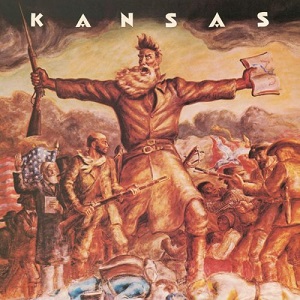




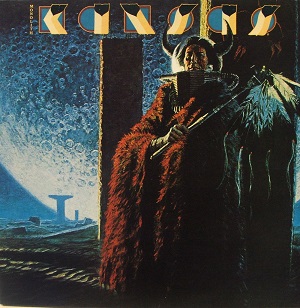


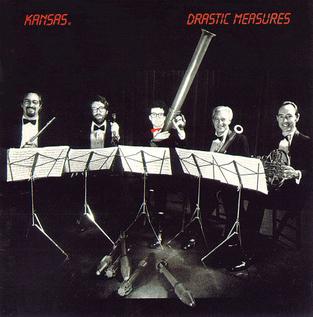

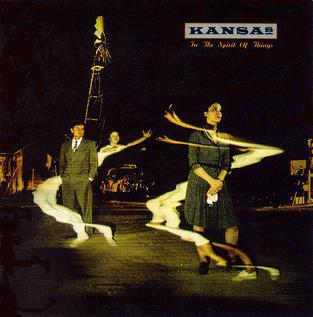
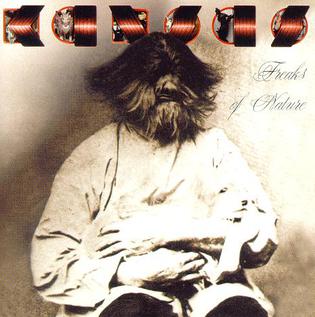


No comments:
Post a Comment